- December 21, 2018
- Posted by: Raz Chorev
- Category: Misceleneous

Due to various
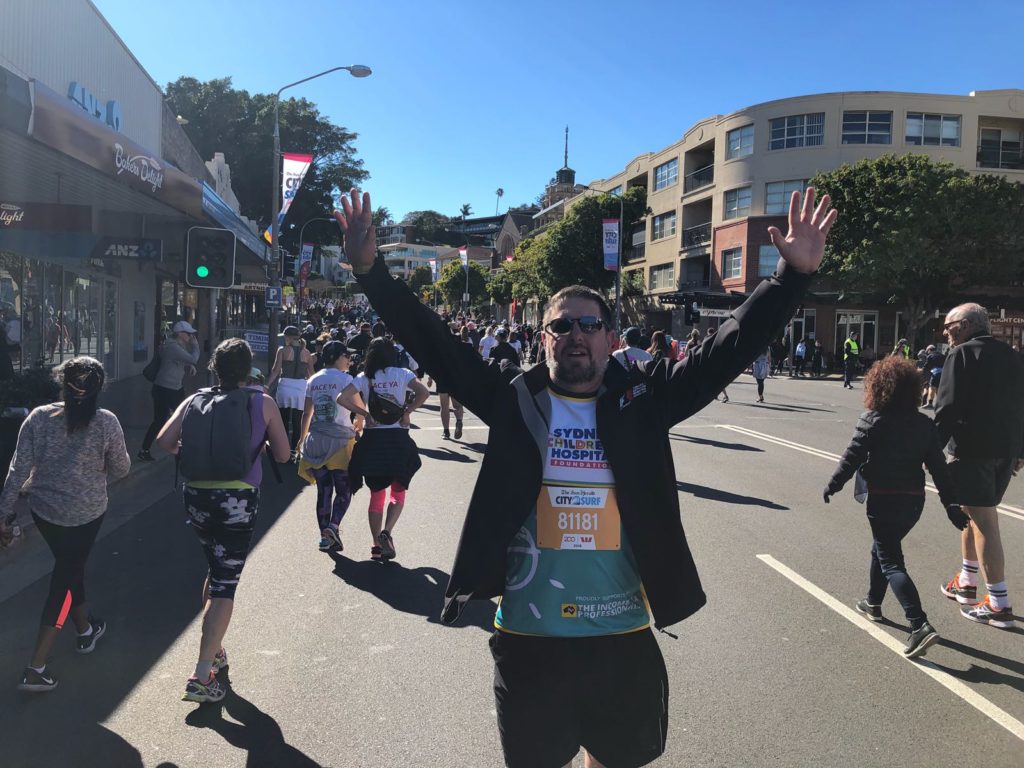
One of the benefits of walking for 1-2 hours per day, is having time to listen to books. I’ve been using Audible.com since 2014, so far “reading” 57 books. 20 of them I’ve added in 2018 alone.
I have to admit that I haven’t had the time to read a paper book this year, but I certainly intend on doing that during the upcoming holiday period.
Some of the books I’ve listened to, I wasn’t so impressed with, so I left them out of this list. The ones on the list (in reverse order of listening), are great books – which challenge the way we perceive the world around us in a variety of ways.
The Black Swan – Nassim Nicholas Taleb
The Impact of the Highly Improbable
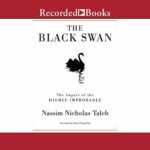
Most predictions are
12 Rules for Life – Jordan B. Peterson
An Antidote to Chaos

Drawing on vivid examples from his clinical practice and personal life, cutting-edge psychology and philosophy, and lessons from humanity’s oldest myths and stories, Peterson takes the listener on an intellectual journey like no other. Gripping, thought-provoking and deeply rewarding.
What I really loved about this book:
- it’s common sense. I didn’t find anything radical in the ideas. Controversial – yes. Radical? Not so much…
- conclusions are drawn and demonstrated from his personal and professional experience, as a clinical psychologist.
- I’ve watched many of his videos on YouTube too, and he’s just as quick-witted and articulated on camera, as in his book.
I really enjoyed that one..
Reality Is Not What It Seems – Carlo Rovelli
The Journey to Quantum Gravity
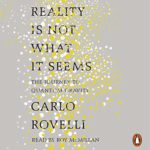
I took on this challenging book, not really understanding what I’m in for… I only managed to go through 9 chapters, before admitting defeat. When it comes to quantum physics, I’m no Sheldon Cooper. The first 7 chapters though, where eye opening though.. It’s a book for non-scientists, wishing to have a clearer understanding of physical reality. However, I found the author to go a bit off-course, and dive deeper into concepts, prematurely (in my honest opinion).
21 Lessons for the 21st Century – Yuval Noah Harari
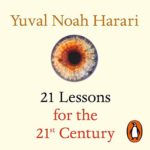
How can we protect ourselves from nuclear war, ecological cataclysms and technological disruptions? What can we do about the epidemic of fake news or the threat of terrorism? What should we teach our children?
Yuval Noah Harari takes us on a thrilling journey through today’s most urgent issues. The golden thread running through his exhilarating new book is the challenge of maintaining our collective and individual focus in the face of constant and disorienting change. Are we still capable of understanding the world we have created?
I loved that book, from the author of Sapiens.
Sapiens showed us where we came from. Homo Deuslooked to the future. 21 Lessons for the 21st Centuryexplores the present. If you’ve read Harari’s previous books, you’ll find some familiar concepts in this book. If you haven’t yet – start with the previous books! It’ll all make sense when you read his books in the right sequence.
Influence – Robert B. Cialdini
The Psychology of Persuasion
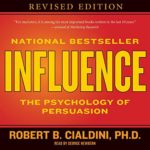
The updated edition of his classic book on persuasion, Dr. Cialdini explains the psychology of why people say yes – and how to apply these understandings.
Dr. Robert Cialdini is the seminal expert in the field of influenceand persuasion. His 35 years of rigorous, evidence-based research, along with a three-year program of study on what moves people to change behaviour, has resulted in this highly acclaimed book.
I loved his 6 principles of persuasion, which help not only to persuade others, but also understand how other people are using those principles to influence you, your actions and your thoughts. .
Leaders Eat Last – Simon Sinek
Why Some Teams Pull Together and Others Don’t
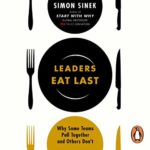
Simon Sinek’s recent video on ‘The Millennial Question’ went viral on Youtube (with over 10M views for this particular video). In Leaders Eat Last, Sinek explores how leaders can inspire cooperation and change, and focuses on the millennial generation in the workplace.
Imagine a world where almost everyone wakes up inspired to go to work. This is not a crazy, idealised notion. In many successful organisations, great leaders are creating environments in which teams trust each other so deeply that they would put their lives on the line for each other.
As one who held managerial positions throughout my career, including a commanding position in the military, I can resonate with many of the concepts in this book.
Shoe Dog – Phil Knight
A Memoir by the Creator of Nike
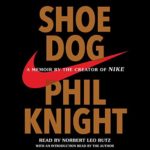
This was one of the most honest, open and transparent entrepreneurial books I’ve ever read. Phil knight describes his personal struggle from the very beginning, without trying to hide the difficulties, and the challenges he encountered along the way. From his dealing with foreign suppliers, employing friends, betrayal of business “partners”, and dealing with running a growing business.
What I really loved about this book, is the personal story. Phil’s relationship with his dad, his wife and kids, his mentor and coach, and the Japanese partners. This book is more about relationships and passion than business, in my opinion.
Narconomics – Tom Wainwright
How to Run a Drug Cartel
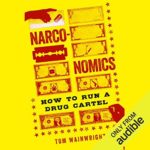
If you’ve been watching Netflix in the past couple of year, I’m sure you’ve noticed the surge in drug-related “documentaries”: Narcos, Narcos Mexico, El Chapo, etc… The drug industry is a multi-Billion dollar, global industry. Their business leaders, are business people! They are facing the same challenges as other businesses: finding good employees, marketing and distribution, competition and finance, and even legal and compliance issues. They take pride in their products, and look after a wide variety of stakeholders. It’s a fun book to read, with many anecdotal stories. And what can government learn to combat this scourge? By analysing the cartels as companies, law enforcers might better understand how they work – and stop throwing away $100 billion a year in a futile effort to win the “war” against this global, highly organized business. Wainwright looks through the cocaine fields in the Andes, prisons in central America, pot shops in Colorado and the dark-web drug forums, to provide a unique look into the drug trade and its 250 million customers.
Blockchain Revolution – Don Tapscott, Alex Tapscott.
How the Technology Behind Bitcoin Is Changing Money, Business and the World
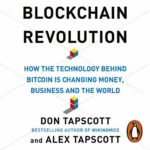
A carefully researched and beautifully written book. Blockchain Revolution argues that the ‘Internet of value’ will transform our lives. Don and Alex brilliantly illuminate the technology that could profoundly impact the way we manage issues of trust, security and privacy for years to come. The Blockchain is to trust as the Internet is to information. Like the original Internet, Blockchain has potential to transform everything. Read this book and you will understand.
Way of the Wolf – Jordan Belfort
Straight Line Selling: Master the Art of Persuasion, Influence, and Success
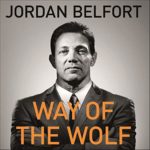
I’m sure you’ve watched the Wolf of Wall Street, the story of Jordan Belfort, as a determined young salesman / stock trader. Belfort have learned many lessons, which helped him create and modify his sales “system”. The movie was better than the book, in my opinion. His sales system seem to be created in hindsight – “here’s what to do if you don’t want to end up like me – in jail and broke”. Some good ideas in the book, but the author lacks the credibility to tell this story, as many of his ideas, are opposing what he actually done.. Do as I say, not as I do,kind-of approach.
Member of the Family – Dianne Lake, Deborah Herman
My Story of Charles Manson, Life Inside His Cult, and the Darkness That Ended the Sixties

Very unusual book for me to read, but I loved it. This is the story of a lost hippie girl, who ended up on the Charles Manson family. The audio book is narrated by the Dianne Lake herself, which adds a very real and human element to the story. The book reveals how quickly we tend to judge people, without actually understanding how they got to the situation they found themselves in. Worth a read.
The Innovator’s Dilemma – Clayton Christensen
Meeting the Challenge of Disruptive Change

Christensen is trying to answer a question faced by many executives in large and small organisations alike: “Does my organization have the right resources, processes, values, and team to innovate?” He then covers the right structure for your specific type of innovation. He identifies where capabilities reside, in resources, processes, and values. He then addresses the migration of capabilities, illustrates it with the example of Digital Equipment (DEC), defines sustaining versus disruptive innovation, how to create capabilities to cope with change – internally, in a spinout, or an acquisition – and how to fit the tool to the task.
This book provides a more holistic view of corporate innovation, which I believe is a better approach to be taken with any project, not just the ones classified as “innovative”.
Crucial Conversations – Kerry Patterson
Tools for Talking When Stakes Are High, Second Edition
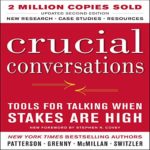
Crucial Conversations exploded onto the scene 10 years ago and revolutionized the way people communicate when stakes are high, opinions vary, and emotions run strong.
In this second edition, the authors have incorporated new evidence how their original concepts actually changed the lives of people who implemented them. An important book, which gives us tools we can use on a daily basis, to help us deal with conversations we needto have.
Fire and Fury – Michael Wolff

Donald Trump has recently completed 2 years in the Oval Office. This book summarised the first 9 months of this administration, and the lead up to the election, which changed the way we look at US presidents.
This is clearly not a Trump supporter book. If the stories told here are true and accurate, we should be afraid. Very, very afraid.
The Economic Singularity – Calum Chace
Artificial Intelligence and the Death of Capitalism
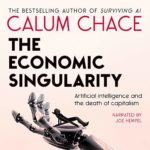
Chace argues that within a few decades, most humans will not be able to work for money. Self-driving cars will probably be the canary in the coal mine, providing a wake-up call for everyone who isn’t yet paying attention. All jobs will be affected, from fast food McJobs to lawyers and journalists. This is the single most important development facing humanity in the first half of the 21st century.
The fashionable belief that universal basic incomeis the solution is only partly correct. We are probably going to need an entirely new economic system, and we better start planning soon – for the economic singularity!
The outcome can be very good; a world in which machines do all the boring jobs and humans do pretty much what they please. But there are major risks, which we can only avoid by being alert to the possible futures and planning how to avoid the negative ones.
Principles – Ray Dalio
Life and Work
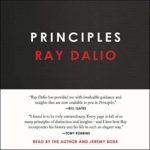
In 1975, Ray Dalio founded an investment firm, Bridgewater Associates, out of his two-bedroom apartment in New York City. Forty years later Bridgewater has made more money for its clients than any other hedge fund in history and grown into the fifth most important private company in the United States.
In this book, Dalio shares his lessons, and summarise them into actionable principles. Those principles (either held from the beginning, or refined over time), helped him build his business and massive wealth.
I always enjoy learning from people who have done it, rather than people reciting other people’s stories. That first-hand experience is brilliantly captured, and beautifully delivered in this book. he book’s hundreds of practical lessons, which are built around his cornerstones of “radical truth” and “radical transparency”, include Dalio laying out the most effective ways for individuals and organizations to make decisions, approach challenges, and build strong teams.
The Four – Scott Galloway
The Hidden DNA of Amazon, Apple, Facebook and Google
I’m just copying here the Published Summary from Audible:
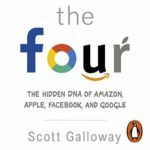
For all that’s been written about the Four over the last two decades, no one has captured their power and staggering success as insightfully as Scott Galloway.
Instead of buying the myths these companies broadcast, Galloway asks fundamental questions. How did the Four infiltrate our lives so completely that they’re almost impossible to avoid (or boycott)? Why does the stock market forgive them for sins that would destroy other firms? And as they race to become the world’s first trillion-dollar company, can anyone challenge them?
In the same irreverent style that has made him one of the world’s most celebrated business professors, Galloway deconstructs the strategies of the Four that lurk beneath their shiny veneers. He shows how they manipulate the fundamental emotional needs that have driven us since our ancestors lived in caves, at a speed and scope others can’t match. And he reveals how you can apply the lessons of their ascent to your own business or career.
Whether you want to compete with them, do business with them, or simply live in the world they dominate, you need to understand the Four.
As always – I’m looking for recommendations! What did you read this year, which made an impact on you? Please share in the comments below.
